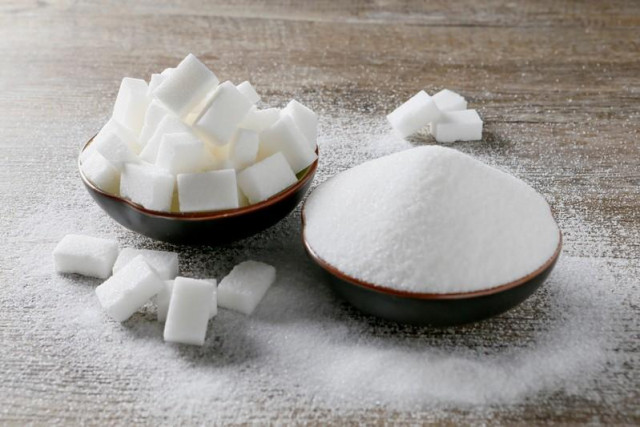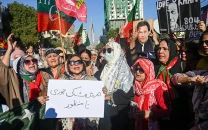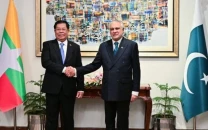Forensic report on sugar crisis delayed
Inquiry report was supposed to be submitted on April 25

Reuters file photo of sugar
In a tweet, the SAPM stated, “Sugar forensic commission report was due today, however the commission has requested the federal government for extension of time (three weeks) for submission of a thorough report and their request will be considered by the federal cabinet on Tuesday.”
On April 4, Prime Minister Imran Khan had directed to make the reports of the sugar and wheat crises public.
To further expand the findings, the premier had directed the committee on sugar to conduct forensic analysis of its findings.
The prime minister had constituted two high-powered committees under Federal Investigation Agency (FIA) Director General Wajid Zia to probe into circumstances that led to the wheat and flour controversy and the reasons behind the increase in sugar prices in the country.
Shocking as it may seem, the leaders of the Pakistan Tehreek-e-Insaf (PTI) were among those who benefited the most from the sugar crisis in the country.
According to the report, PTI former secretary general Jahangir Khan Tareen and a brother of ex-minister for National Food Security Makhdoom Khusro Bukhtiar were the major beneficiaries of the sugar crisis.
Terming the principles of transparency and accountability as basic ingredients of democracy and good governance, PM Imran had made both the reports and additional responses public.
Akbar had then tweeted that the premier decided to make the reports of committees on wheat and sugar public in pursuit of PTI manifesto of accountability for all in Naya Pakistan.
As per the findings of the report, the companies owned and controlled by Jahangir Khan Tareen (JDW) exported 17.24% of its total production and availed 22.71% of the total export subsidy amounting to Rs561 million.
The companies owned and controlled by Makhdum Omer Sheryar – a relative of Makhdoom Khusro Bukhtiar – (RYK Group) had exported 31.17% of its total production and availed 18.31% of the total export subsidy amounting to Rs452 million.
Surprisingly, the committee had found that the Punjab government was providing the subsidy for export of sugar at a time when the price of the commodity was increasing in the domestic market.
Out of 0.762 million tonnes of sugar exported, 0.474 million tonnes (62%) was exported before the withdrawal of subsidy, while the remaining 38% was exported after the withdrawal.
It was also stated in the report that Rs3 billion were allocated by the Punjab government for the subsidy from January 2019 onwards but Rs2.47 billion were utilised from January 1 to May 24, 2019.
“It can be seen that the sugar mill owners who availed maximum subsidy had political clout and influence in decision making and they tried to gain maximum benefit in a very limited time,” the report stated.
The committee maintained that a deeper assessment of the reasons for awarding of subsidy after associating the government and the mill owners/beneficiaries was required, adding it would be done by the commission constituted to probe the matter further.
The committee in its findings stated the opinion was based on the documentary evidence that the export of sugar was not justified as the sugarcane production was expected to be low in the upcoming harvesting season 2018-2019 and with the export of commodity in January 2019, the price of sugar started increasing immediately in the local market.
After explaining the concept of cartelisation, the body observed that the exporters of sugar gained benefit in two ways: first they were able to gain subsidy and secondly, they made profits from the increasing sugar prices in the local market.
The price of sugar increased from Rs55 per kg in December 2018 to Rs71.44 per kg in June 2019 although the GST increase was implemented from July 1, 2019.
The report stated that no other government, except the government of Punjab provided the subsidy of Rs3 billion.
It also noted that the Sugar Advisory Board failed to take timely decision to ban the export of sugar and mills that benefitted from the subsidy on export.
While preparing the report, ex-mill price, commission of agent, transportation cost, profit margin wholesaler or broker, and profit margin of retailer were taken into consideration.
The report revealed that the Commission of Inquiry had started its work and nine teams were already on the ground for the forensic analysis of several companies.
Each team comprises of officers of the FIA, Anti-Corruption Establishment Punjab, Security and Exchange Commission of Pakistan, State Bank of Pakistan, Auditor General of Pakistan (DG commercial audit), Federal Board of Revenue, Intelligence Bureau and Inter-Services Intelligence.
The report observed that the Commission of Inquiry was given the time frame of 40 days for the completion of its work.
The federal government through a cabinet decision, however, had expanded the scope of the inquiry committee to an Inquiry Commission by conferring powers given under The Pakistan Commissions of Inquiry Act 2017.
The commission was further carrying out forensic analysis to expand on the findings of the inquiry committee and was due to complete its task on April 25, 2020, after which the findings were promised to be made public and any corrective or punitive measures required or recommended would have been taken.
On April 20, it was reported that the National Accountability Bureau (NAB) had started an inquiry into the wheat and sugar crises after the government handed over the case to the country's premier graft-buster after receiving a report from the Federal Investigation Agency (FIA).
According to sources, the anti-corruption watchdog chief Justice (retd) Javed Iqbal had assigned the inquiry to Rawalpindi NAB Director General Irfan Mangi.
The NAB chairman also directed Mangi to submit a report within a month, the sources added.
Earlier, Federal Minister for Railways Sheikh Rashid had also said that the forensic report of sugar price hike could get delayed by 5 to 10 days. He, however, said that the “report would surely come”.


















COMMENTS
Comments are moderated and generally will be posted if they are on-topic and not abusive.
For more information, please see our Comments FAQ